Archive for June 2nd, 2010
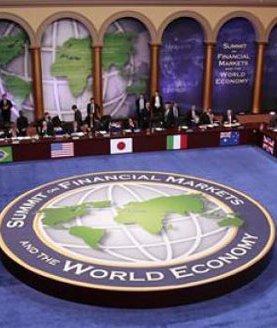
G20 leaders to discuss bank tax
 (Reuters): Finance ministers and central bankers from the G20 group of countries meet in Busan, Korea on June 4-5 to discuss progress in implementing their pledges to make the world’s financial system safer. Leaders have agreed that banks should be made to pay for bailing out the sector in a future crisis so they can no longer believe they are "too big to fail" or that taxpayers will always be there to rescue them. The International Monetary Fund has proposed two new taxes on banks. The financial stability contribution (FSC) linked to a resolution mechanism to pay for the fiscal cost of any future government support and a financial activities tax (FAT) levied on the profits of financial institutions.
(Reuters): Finance ministers and central bankers from the G20 group of countries meet in Busan, Korea on June 4-5 to discuss progress in implementing their pledges to make the world’s financial system safer. Leaders have agreed that banks should be made to pay for bailing out the sector in a future crisis so they can no longer believe they are "too big to fail" or that taxpayers will always be there to rescue them. The International Monetary Fund has proposed two new taxes on banks. The financial stability contribution (FSC) linked to a resolution mechanism to pay for the fiscal cost of any future government support and a financial activities tax (FAT) levied on the profits of financial institutions.
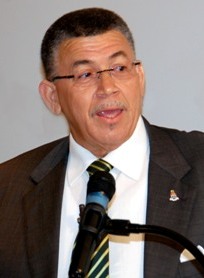
Mac to meet new UK minister
 (CNS): The premier begins another round of overseas travel tomorrow, starting in Bermuda for the pre Overseas Territories Consultative Council meeting before heading to London for key budget talks with the new Overseas Territories Minister. McKeeva Bush will be meeting Henry Bellingham for the first time on Tuesday, 8 June, when he will be discussing the Cayman Islands’ borrowing requirement to help balance this year’s budget deficit and meet the payments on next year’s capital projects. Government has still not revealed how the UK has reacted to its proposed three year financial plan or if the minister will be willing to agree to the $200 million or more which it is estimated government will need to borrow.
(CNS): The premier begins another round of overseas travel tomorrow, starting in Bermuda for the pre Overseas Territories Consultative Council meeting before heading to London for key budget talks with the new Overseas Territories Minister. McKeeva Bush will be meeting Henry Bellingham for the first time on Tuesday, 8 June, when he will be discussing the Cayman Islands’ borrowing requirement to help balance this year’s budget deficit and meet the payments on next year’s capital projects. Government has still not revealed how the UK has reacted to its proposed three year financial plan or if the minister will be willing to agree to the $200 million or more which it is estimated government will need to borrow.

Tax-haven poker websites hit jackpot
 (SMH.com): Prohibition of online poker in Australia has failed to halt the industry’s growth, thanks to the brazen marketing tactics of offshore companies and a reluctance to prosecute illegal operators. Australian visitors to poker websites are increasing by about 20 per cent a year and it is estimated $333 million will flow offshore this year from Australian players alone. Most of the companies offering online poker have bases in tax havens, although some are listed on the London Stock Exchange since Britain legalised interactive gaming.
(SMH.com): Prohibition of online poker in Australia has failed to halt the industry’s growth, thanks to the brazen marketing tactics of offshore companies and a reluctance to prosecute illegal operators. Australian visitors to poker websites are increasing by about 20 per cent a year and it is estimated $333 million will flow offshore this year from Australian players alone. Most of the companies offering online poker have bases in tax havens, although some are listed on the London Stock Exchange since Britain legalised interactive gaming.

Jet Around Cayman brings in the pros
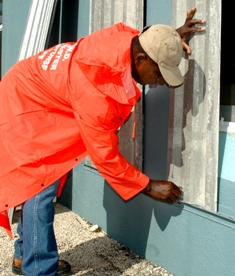
Shutter team earns cash bonus for speed
 (CNS): Despite the impending pay cuts across government departments some employees at the Public Works Department (PWD) and National Roads Authority (NRA) got a little boost to their pockets recently with an efficiency reward following the recent national hurricane exercise. The deputy premier and works minister gave a letter of commendation and cash from her personal funds to the team leader, PWD Foreman Thomas Ebanks. The seven-member crew shuttered seven buildings in two hours and twenty minutes, before going on to assist a rival team with its work.
(CNS): Despite the impending pay cuts across government departments some employees at the Public Works Department (PWD) and National Roads Authority (NRA) got a little boost to their pockets recently with an efficiency reward following the recent national hurricane exercise. The deputy premier and works minister gave a letter of commendation and cash from her personal funds to the team leader, PWD Foreman Thomas Ebanks. The seven-member crew shuttered seven buildings in two hours and twenty minutes, before going on to assist a rival team with its work.
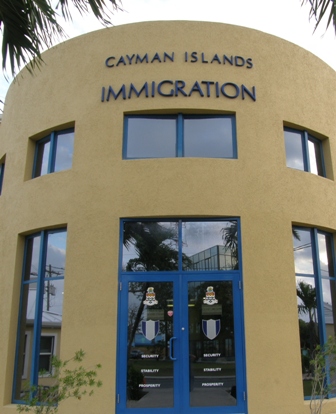
Immigration takes on eleven new recruits
 (CNS): The immigration department is currently training a new class of eleven recruits the first to join the front line since 2007 the department said. The officers are undergoing a month long training programme in order to become immigration officers the men and women will cover a diverse range of topics such as forgery detection; interview techniques; behaviour analysis; enforcement; and intelligence. Chief Immigration Officer Linda Evans illustrated the unique nature of the Cayman Islands immigration service when she told the recruits of the delicate balancing act, as both gatekeepers and goodwill ambassadors that they faced.
(CNS): The immigration department is currently training a new class of eleven recruits the first to join the front line since 2007 the department said. The officers are undergoing a month long training programme in order to become immigration officers the men and women will cover a diverse range of topics such as forgery detection; interview techniques; behaviour analysis; enforcement; and intelligence. Chief Immigration Officer Linda Evans illustrated the unique nature of the Cayman Islands immigration service when she told the recruits of the delicate balancing act, as both gatekeepers and goodwill ambassadors that they faced.

New firm presents greener energy services
 (CNS): Two local businesses with an eye on energy efficiency and sustainability have merged to provide an even more green service to residents in the Cayman Islands. While sustainable and alternative energy solutions remain in their infancy in the jurisdiction, the two companies hope to encourage more people to both maximise energy efficiency and turn to the sun as an alternative for their power source. Arch Solar Ltd, a contractor providing renewable solar energy systems, has acquired Smart Energy Management, which provides residential and commercial building performance assessments that help people cut down on energy use and power bills by as much as 40%.
(CNS): Two local businesses with an eye on energy efficiency and sustainability have merged to provide an even more green service to residents in the Cayman Islands. While sustainable and alternative energy solutions remain in their infancy in the jurisdiction, the two companies hope to encourage more people to both maximise energy efficiency and turn to the sun as an alternative for their power source. Arch Solar Ltd, a contractor providing renewable solar energy systems, has acquired Smart Energy Management, which provides residential and commercial building performance assessments that help people cut down on energy use and power bills by as much as 40%.
Smart Energy’s founder, Jorge Vera, said he was first introduced to Arch Solar in 2009 and the two firms began planning their formal alliance in order to expand the services the two firms offer. Smart Energy and Arch Solar share the combined goals of energy efficiency and sustainability in residential and commercial spaces.

Fixing Cayman’s financial problems
Over a year ago I wrote that Government and the private sector should don their rain gear as the global financial crisis started to bite in Cayman. People said I was being a Cassandra. Nearly ten years ago, I wrote that Cayman’s revenue base was too narrow to sustain its development and the needs of a growing population, certainly not in a down economy.
I recommended a modest annual property tax specifically dedicated to building and maintaining the infrastructure. I also recommended that Cayman should develop a ten year plan for independence (a discussion for another day). People said I had truly lost it with these two suggestions. And now we are in the perfect storm, with the UK running interference and no real progress with long term solutions.
Earlier Governments wisely put in place mains water supply, sewage (but as yet only for part of the Islands), new airport and hospital and mandatory health insurance and pensions. But we then lived on borrowed time by deferring investment in roads, schools, port, runway extension and waste management. The previous Government decided to build the roads, schools and a new Government building simultaneously and without proper long term funding/financing for these projects. Also, over the past few boom years, Government operating expenditures troublingly grew as a percentage both of revenue and GDP. Paradoxically, the Ivan disaster produced a huge inflow of overseas insurance and reinsurance money and (even with the duty waivers and reductions) the Governments coffers filled with import duties on (re)building materials and replacement equipment and goods of all kinds. This inevitably tailed off. Then the global crisis hit and our two main economic drivers, tourism and financial services, stopped expanding and then slid backwards. Real estate, construction, support services and consumer spending all suffered. 2009 Government revenue suddenly sank well below projections, yet Government expenditure continued unabated.
Voters everywhere continually demand more and better services, all too often from their Government. And politicians promise to deliver them. So either we stop demanding or we (not just others) have to pay for these services. And there are indeed vital projects still to be undertaken here. The most pressing (and maybe the most expensive) is waste management and the current landfills in particular. Even the most optimistic realtor, developer and “no new taxes” lobbyist must be aware that the south end of Seven Mile Beach, Camana Bay and the bypass stretch are exposed to a potential toxic disaster (air pollution already and soil and water pollution that may be happening unseen underground). What price tourism, real estate and the North Sound if that occurs (and the crime wave and poor underresourced policing continue)?
There are some things we should stop doing. First, bashing the UK. This may play well locally for a time but is unproductive. Second, saying we just have a short term cash flow problem and all will be well if we can borrow some cheap dollars to keep us going until the boom times in tourism and the financial services industries restart. Those times may be a while coming(and we must ensure the right platforms to encourage these key industries), and the traditional revenue streams from these industries will likely be insufficient for the long term. Third, saying we just cut Government expenditure, eliminate waste and abuse in Government services, downsize the civil service and improve civil service performance. Steps must be taken (the civil service and statutory authorities are in the aggregate far too large a percentage of the total work force), certainly to freeze the expansion, but it will be very hard in reality to turn the clock back (just count the votes). Fourth, saying that privatization and public/private partnerships and private finance initiatives are the solution. There are some sensible options, but these are not sufficient to handle the problems. Fifth, saying that our ratios of debt and debt servicing costs to GDP are and will be well in line with other countries. This is misleading if most of that GDP is off limits as a source of Government revenue, i.e. we are not prepared to tax it directly! I suspect Moody’s may not have taken this into account in their recent rating confirmation of Cayman. Sixth, parroting “do not raise taxes in a recession”. This comes from the same people who during good times say “do not raise taxes, you will stop the boom”. Lastly, painting this as a Caymanian-non Caymanian issue. We are all in this together.
We should not ape the fiscally irresponsible behaviour of the US and the UK. Fortunately, we cannot “print money” and flood the market with CI$ debt that we cheapen by devaluing the currency (since Government borrowings are essentially in US$, we leave the Fed to do that for us!). We need to reinstate sound Government finances. I believe this is possible but contributions are required from the entire resident community and those invested locally. The self-interested “nail the other guy, he’s not at the table so he can be lunch” is very unhelpful. Suggestions should be constructive with a willingness to compromise for the greater long term good.
We now have deficit figures for the last fiscal year (disturbing even if predictable), an optimistic proposed budget for the current fiscal year and UK in-principle and conditional consent to a portion of the loans requested (as yet we do not know which financial institutions have made firm commitments to fund the loans). The UK still requires, not only satisfactory short term fixes, but also a long term plan for sustainable revenues/financing and expenditure cuts/containment to match (phased implementation should be possible). In our own interests, we should also set clear priorities.
The short to medium term solutions outlined so far in the proposed budget call for swingeing increases in the usual indirect fees and duties (e.g. import duties –effectively our sales tax, financial services and company fees, work permits, etc), a 2% levy on money transfers through licensed money services companies (but not through banks) and various other miscellaneous fees, a new annual business premises fee payable by the tenant of 10% per annum of the rent (with the concession that no such fee is payable on leases in force on which stamp duty has already been paid), one off savings (e.g. deferrals and perhaps cancellations of services and projects) and windfalls, civil service/statutory authority hiring and remuneration freezes, disposition/refinancing of Government assets/liabilities etc., and improved efficiencies, performance and collections (delivery is another question). But I fear that, given there is little hard evidence of sustained cuts on the expenditure side and of specific long term funding/financing of capital projects, there needs to be detailed study followed by action that broadens in the longer term the revenue base through meaningful new levies (implemented in a sensible staged manner) that are not so dependent on perpetual boom times and buoyant consumption. And this is not simply because the UK tellsus this. If we fail to do this, we are likely only kicking the can down the road for a short while.
Taxes should be fair, have the lowest adverse impact on economic activity and should be cost effective to collect and enforce. There are two new proposals in particular that do not meet the tests.
The proposed 2% levy on money transfers through money services licensees is unfair as it hits those at the bottom end of the economic scale (who have also been abandoned by the traditional banking system; perhaps the retail banks will be good community citizens and now rethink this poor attitude). It also sets a very ill advised precedent (thin edge of the wedge) as it will be seen as a tax on cross border fund transfers, an anathema to the global financial industry. Finally, it can only be short term, as in a few years, it will be uncollectible as electronic money transfers by cell phone will be possible (this is happening elsewhere already).
The proposed 10% business premises levy on rents (to be an obligation of the tenant but, it appears, to be collected by the landlord and remitted to the Government) fails to meet all the tests (the last one in particular) and is potentially open to nonpayment and fraud, in the same way as stamp duty, health insurance and pension contributions. And in the current climate, I fear that it may finally drive under many small businesses that are already struggling, if they have lease renewals coming up. Also, the new 10 % annual levy may adversely impact one of the key things Cayman needs to do to get the economy going again; that is to encourage greater economic activity here with new financial businesses establishing physical offices with people living and working here in and making real decisions. My concern is that this new in-your-face line item (combined with the ever increasing work permit fees) in the budget of a fund or investment manager considering a physical presence here might be a turn-off. To put this in perspective: currently a 5 year lease at an annual rent of US$250,000 carries upfront stamp duty of 5 %, i.e. a one off US$12,500 approximately; under the new regime, no stamp duty but an annual tax of 10%, i.e. an annual US$25,000, and thus US$125,000 over the five years.
I also question whether this new levy will result in tenants buying or building their own premises. Anecdotally, the response seems negative. The market is a lot more complex than that. First, many smaller tenants are in no financial position to buy or build. Second, in Cayman other than major retail banks (and most already have their own bricks and mortar), financial services and professional firms typically do not own their office premises as it limits their flexibility for growth (or downsizing) and ownership causes succession problems and more for partnerships. Third, major tenants are usually already tied into long term leases. Fourth, I wonder if the existing landlord/owner lobby has thought carefully enough about the implications in the unlikely event of their major tenants constructing their own buildings and vacating their current premises. A whole lot of empty buildings, so be careful what you wish for.
I must emphasise that new taxes should only be imposed if and to the extent that the various short-medium term measures outlined in the budget fall short or are not sustainable. Applying the three tests outlined above, I suggest for mature study and consideration three possible new revenue sources. First, a modest annual community service charge on real estate dedicated to appropriate infrastructure and services (like waste management) and collected by the Land Registry (there can be exemptions for those who genuinely cannot pay and for low value properties, perhaps variable rates/bands depending on the usage and value and a credit/reduction of the upfront stamp duty already paid or payable). Second, a levy on electricity, telephone (including prepaid cell phones), TV and water bills collected by the utility companies. Thirdly, and very reluctantly ifall else fails, casino licences (collected by a new Gaming Board). These could together raise a stable CI$45-CI$75 million annually for Government fairly, with low adverse economic impact, at a reasonable cost and with a high collection rate.
This article is an expanded version of the article that appears in the October issue of the Journal.
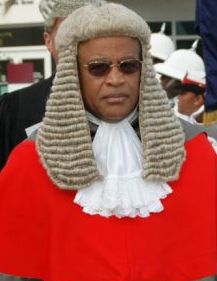
Judges give up pay rise
 (CNS): Although the country’s judiciary should have received a biennial cost of living allowance of 2.2% last year, the Chief Justice’s Office has stated that, in support of the civil service, the judges will be giving up the increase from 1 July. Following speculation that government had approved salary increases for judges, a statement from Chief Justice Anthony Smellie indicates that this is not the case but that under the terms of the Judges Emoluments and Allowances Law and Order they are entitled to an adjustment every two years based on inflation. Judges should have received this last September but it was delayed because the cost of living index was not published until earlier this year.
(CNS): Although the country’s judiciary should have received a biennial cost of living allowance of 2.2% last year, the Chief Justice’s Office has stated that, in support of the civil service, the judges will be giving up the increase from 1 July. Following speculation that government had approved salary increases for judges, a statement from Chief Justice Anthony Smellie indicates that this is not the case but that under the terms of the Judges Emoluments and Allowances Law and Order they are entitled to an adjustment every two years based on inflation. Judges should have received this last September but it was delayed because the cost of living index was not published until earlier this year.
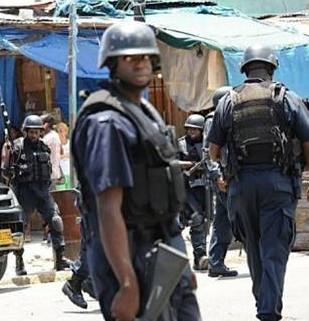
Dudus’ brother ‘Livity’ hands himself in to police
 (CNS): The brother of Christopher ‘Dudus’ Coke is now in the custody of the Jamaican security forces, according to local reports. Leighton ‘Livity’ Coke, who was placed on the police most wanted list last week, turned himself in late Tuesday. However, his now infamous brother remains on the run, evading capture despite a week-long assault on is stronghold of Tivoli Gardens that has left at least 73 civilians dead and divided the country. Many Jamaicans are hailing what they see as a chance to fight rampant crime but others are alarmed at the incredibly heavy price in human lives.
(CNS): The brother of Christopher ‘Dudus’ Coke is now in the custody of the Jamaican security forces, according to local reports. Leighton ‘Livity’ Coke, who was placed on the police most wanted list last week, turned himself in late Tuesday. However, his now infamous brother remains on the run, evading capture despite a week-long assault on is stronghold of Tivoli Gardens that has left at least 73 civilians dead and divided the country. Many Jamaicans are hailing what they see as a chance to fight rampant crime but others are alarmed at the incredibly heavy price in human lives.
‘Dudus’ Coke, who is wanted by the US authorities for drug and gun trafficking charges, is said to have escaped through the barricaded West Kingston area which was at the centre of a heavy security operation throughout last week.